
Global geopolitical tensions have reached their highest levels since WWII. 92 countries are currently involved in conflicts beyond their borders and the Global Peace Index has measured “peacefulness” declining in nine out of the last ten years. The push to decrease human casualties, combined with recent technological advances, has created a new environment that has governments turning to the historically innovative private sector to stay competitive and defend against potential threats.
In the last three years alone, U.S. venture capital (VC) funds have injected over $100B into defense-tech companies. And while Department of Defense (DoD) contracts have typically been awarded to established players like Lockheed Martin, RTX, Northrup Grummon, and others, DoD innovation organizations (e.g., DIU, AFWERX, NavalX, and more) are increasingly working with startups to source innovative solutions.
As founders consider investment partners for their defense or dual-use technology ventures, we’ve put together a list of top funds to consider. And if you are an investor and think you should be on this list, contact us!
Outlander VC
About: Top decile-performing generalist pre-seed fund, led by U.S. Marine Corps veteran and defense & intelligence-tech founder Paige Craig, investing at the earliest stages (often first check in).
Stages: Mostly Pre-Seed to Seed
Notable Investments: Scale, ID.me, SpaceX, REGENT, Skyways, Havoc, Vidrovr, Next Stage
How to Apply: Apply directly through this form
Moonshots Capital
About: With 13 unicorns and 27 total exits, Moonshots is a veteran-led seed & early Series A fund investing in bold founders.
Stages: Seed to Series A
Notable Investments: Slack, LinkedIn, Carta, ID.me, Red 6
Application: Submit proposals through their website
Point72 Ventures
About: Point72 Ventures is the VC arm of Point72 Capital and has a team that includes Managing Partner Dan Gwak, a U.S. Marine Corps veteran turned investor.
Stages: Pre-Seed to Growth
Notable Investments: Shield AI, Vannevar Labs, STOKE Space, Saronic, REGENT
How to Apply: The best way to be considered is to get an intro to a relevant investing partner, but you can also email directly to ideas@p72.vc
Alumni Ventures
About: A top-quartile performing venture fund that also invests in defense & dual-use technologies.
Stages: Pre-seed to Growth
Notable Investments: Unstructured.io, Red 6, Picogrid, Antares Industries, Edgescale AI, Sphere Semi
How to Apply: Apply directly through this form
Decisive Point Ventures
About: A VC fund focused on making early-stage investments in technology for government, public safety, and defense.
Stages: Predominantly Seed & Series A
Notable Investments: Scout Space, Radiant, Aloft, Firehawk Aerospace
How to Apply: The best way to be considered is to get an intro to a relevant investing partner, but you can also email directly to info@decisivepoint.com
First In Ventures
About: Veteran-led fund investing in security tech solutions across commercial, military, or intelligence sectors.
Stages: Predominantly Pre-Seed & Seed
Notable Investments: Anduril, Shift5, RedOwl, Syncurity
How to Apply: Fill out this form
RTX Ventures
About: Venture capital division of RTX (formerly Raytheon Technologies). Led by Daniel Ateya
Stages: Predominantly Seed & Series A
Notable Investments: Ursa Major, Hermeus, EnCharge AI, Tomorrow.io
How to Apply: Contact through the RTX Ventures website
In-Q-Tel
About: CIA-contracted investment fund, designed to source innovative information technology solutions for the Central Intelligence Agency. Led by Steve Bowsher.
Stages: Seed, Series A, sometimes later
Notable Investments: Palantir, Databricks, MongoDB, Anaconda
How to Apply: Apply directly through this form
Shield Capital
About: Former DoD Defense Innovation Unit leader and former Symantec CEO Michael Brown became a partner at Shield Capital in 2023 to invest in dual-use defense, cybersecurity, and space companies.
Stages: Seed to Series B
Notable Investments: Nexla, Apex, ASI, Rebellion
Application: Apply directly through this form
a16z’s American Dynamism
About: Andreesen Horowitz’s American Dynamism practice invests in founders and companies that support the national interest: aerospace, defense, public safety, education, housing, supply chain, industrials, and manufacturing.
Stages: Seed to Growth
Notable Investments: Anduril, Apex, Hadrian
How to Apply: Reach out or get an intro to a relevant investing partner
Silent Ventures
About: Early stage venture firm that invests in exceptional founders building unrivaled aerospace, defense, and national security companies.
Stages: Predominantly Pre-Seed & Seed
Notable Investments: Hadrian, Armada AI, Firestorm
How to Apply: Apply or reach out on LinkedIn
Lockheed Martin Ventures
About: The VC arm of defense giant, Lockheed Martin, doubled its fund commitment from $200M to $400M in 2022, rooted in its belief that the most dynamic defense innovations will come from startups.
Stages: Pre-seed to Growth
Notable Investments: Elroy Air, Hawkeye 360, Heilcity Space, X-Bow
How to Apply: Apply directly through this contact form
Champion Hill Ventures
About: Led by a former infantry and combat engineer officer in the US Marine Corps, Champion Hill has invested in some of the hottest defense tech & space startups.
Stages: Pre-Seed to Seed
Notable Investments: SpaceX, Anduril, and Umbra
How to Apply: Get an intro to or reach out to Managing Partner Josh Manchester.
Insight Partners
About: Generalist VC, increasingly making investments in defense-focused startups
Stages: Pre-seed to Growth
Notable Investments: Rebellion, Tenable, Digital Harbor
Application: Apply through their website
Lux Capital
About: Science & technology venture fund, making strategic investments to protect America’s economic security.
Stages: Any stage
Notable Investments: Anduril, Hadrian, Saildrone
Application: Connect with (or get introduced to) a relevant investing partner
Starburst Ventures
About: Aerospace & Defense investor for America and its allies.
Stages: Seed to Series A
Notable Investments: Strong Compute, Outpost, Aerocloud
Application: Join one of their accelerators or submit proposals through their website
Scout Ventures
About: Early-stage venture capital firm that invests in frontier technologies built by founders from the military, its intelligence community, and national research labs.
Stages: Seed to Series B
Notable Investments: ID.me, Radical, Voyager Space, Tomahawk Robotics
Application: Submit proposals through their website
For founders of dual-use start-ups seeking funding, Outlander VC offers unparalleled expertise and strategic support. If you are a defense technology start-up seeking funding and strategic guidance, apply to Outlander VC today.
Welcome back to Venture Visionaries, a new series brought to you by Outlander VC. Hosted by Paige Craig, Managing Partner at Outlander VC, this series explores what sets these investors apart and provides unique insights into their perspectives on the startup world. Join us as we sit down with some of the most influential investors in the industry, uncovering the secrets behind their success and learning how they navigate the ever-changing landscape of investing.
From their investment strategies to their predictions for the future, we’ll bring you inspiring conversations that’ll resonate with aspiring entrepreneurs and anyone curious about the world of venture capital.
This month, we had the pleasure of sitting down with CRV’s Saar Gur, who has invested in household-name companies like DoorDash, Ring, Patreon, and AirTable. Below, you’ll find three of our favorite takeaways from that conversation, but you can also watch the full interview here. Let’s dive in!
One of the standout messages from our conversation with CRV’s Saar Gur was that when he invested in Patreon, DoorDash, and Ring, for example, they weren’t obvious. In Gur’s own words, they were actually, “pretty funky” at the time.
But Gur has found a lot of investment success in looking towards the weird and wonderful, to the less obvious solutions that have early utility and could therefore make a convincing case of mainstream viability. In some cases, Gur argues that “the weirder the better,” because these differentiating qualities capture attention. It can also help founders make a stronger case for why their solution is going to come out on top. “Doing AI for customer support makes a ton of sense [but] it’s not totally clear to me why a startup is gonna win that.” So when founders can be bold enough for their solution to be different, not obvious, and then demonstrate that it’s not just a dream, but that there are early signs of product-market fit – that’s where the magic happens.
As a complete, non-tech, real-world example, Gur talked about how teaching yoga on Stanford’s campus was illegal 20 years ago and now there are more yoga studios in Palo Alto than traditional gyms. What used to be a “weird,” fermented drink called kombucha 15 years ago is now sold at Seven Elevens. Now compare this with Ring – founder Jamie Simiofff was famously rejected on Shark Tank in 2013, but his “weird” DoorBot eventually transformed home and community security, selling to Amazon for a monumental deal in 2018.
The big takeaway: dare to be weird, but also be useful.
To really catch Gur’s eye, he has to believe that the market opportunity is massive. “A lot of passing happens where I just can’t see how this can be a huge business […] we’re looking for businesses that can generate billions of dollars in revenue.” He loves commercially-oriented founders who are deeply in touch with the problems they are solving, are so obsessed that they will teach him something new (that’s his favorite part of the job!), and can see market opportunities from new angles. These traits are part of what make up a north star in Gur’s investing decisions: the founder-market fit.
With DoorDash CEO, Tony Xu, the founder-market fit was clear to Gur right from the first meeting, which enabled DoorDash to stand out from the other food delivery companies that Gur was doing diligence on at the time. The profoundly emotional experience with the problem had already been clear to Gur: as a parent, “at that time, you couldn’t reliably order food […] if you had young kids, they were going to melt down if that food showed up half an hour, an hour late.” But Xu’s conviction and approach made it clear that DoorDash realized they were running a logistics business and that their solution came from a deep understanding of the restaurants’ problems as much as the consumer. That combination of a deep understanding of those problems combined with the unit economic orientation and Xu’s passion & conviction sold Gur: ”I was like, Oh my God, [this is what] I’ve been looking for.”
The big takeaway: Go after a multi-billion-dollar problem and spend time understanding why you, as a founder, are the right person to lead the charge in solving it. Be obsessed and be honest with yourself so that you can develop the clear conviction needed to stand apart.
Founders still have to do all of the difficult work in finding product-market fit, acquiring customers, and wearing all of the hats that come with entrepreneurship, but now with the added challenge that getting capital over the last two years has gotten increasingly harder. There will always be plenty of investors looking for great founders with even greater ideas, but the new fundraising environment is certainly more difficult.
Newer companies will find it easier to raise; Gur pointed out that “most of the companies that we invest in [are] in the first 18-to-36 months from incorporation.” Even so, Gur believes all founders of all stages will need total conviction in the problem, market, and their differentiated story to succeed. Fundraising challenges, after all, don’t stop after getting seed funding. “Even if you get it at seed, at the next stage, at Series A, at Series B – the fall-off rates are very high.” While they haven’t participated as much, Gur has also seen the industry’s rising number of down and inside rounds and shared some practical advice for founders who may be facing that exact predicament:
The big takeaway: Conviction and honesty are key. In this fundraising market, Gur sees founders who are struggling and need to raise a down round having more success in doing the hard and honest work with their current investors first before approaching new investors.
We covered so much more in our conversation with CRV’s Saar Gur that is absolutely worth a listen. From how AI is a powerful accelerant to creativity to how CRV sees its role in providing value and guidance to its portfolio companies to how Facebook changed private markets forever…you don’t want to miss out on all of the other gems this and future conversations provide! Click here to watch the full interview and, if you haven’t already, join our mailing list so we can continue bringing you valuable content to help in your founder journey!
Up next, we will be sitting down with Mercedes Bent of Lightspeed Venture Partners, a renowned venture capitalist known for her keen eye in identifying breakthrough startups and top-performing founders. We’ll dive deep into the key characteristics that make founders successful and the traits that set breakthrough startups apart from the rest. You can RSVP for the 5/22 live interview or signup to receive the asynchronous viewing link afterwards here!

For 14+ years, we’ve invested in unicorns like Lyft, Wish, Gusto, and Scale at the earliest stages. Watch our April 4th Outlander Spring Showcase to meet 5 of our current early-stage portfolio companies: Crow Industries, HavocAI, Lula Convenience, Skyways, and Tryby!
Here’s an overview the lineup:
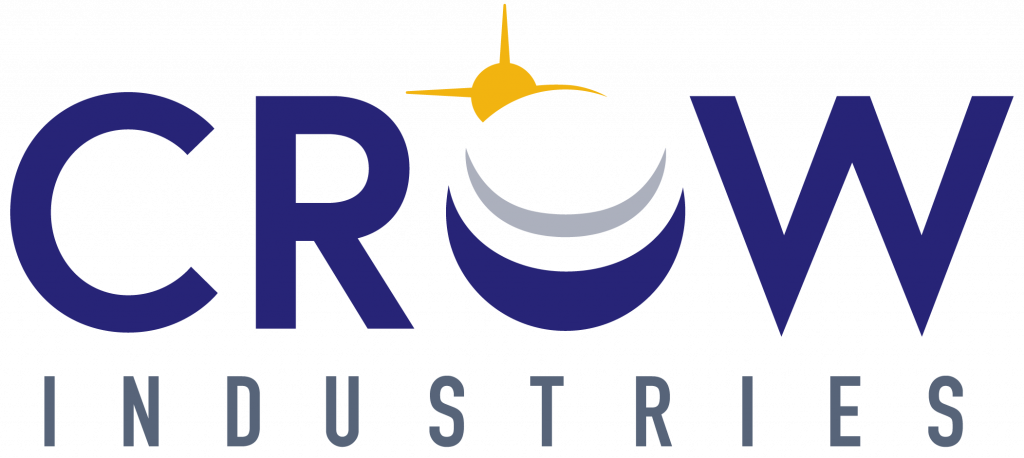
🎯 autonomy, ML/AI, robotics 📍 Scottsdale, Arizona
🎙 James Crowell, CEO + Founder 📧 info@crowindustriesinc.com
Crow Industries (CI) is a full-stack autonomy startup focused on developing cognitive heavy equipment for the mining industry.
The mining industry is experiencing major production shortages due to a growing labor crisis, precisely when production of critical minerals must dramatically increase to keep pace with the Clean Energy Transition. CI is working to close this labor gap by creating fully autonomous fleets for mine operators that go far beyond the automated equipment utilized today. Rather than one person operating one machine, CI’s solution will allow one person to supervise hundreds of machines at multiple sites, monitoring for problems that may arise in real time. The company successfully completed the Techstars Industries of the Future accelerator last summer, Outlander VC led their PreSeed in the Fall, and Winklevoss Capital joined the round soon after.
Best Outlander VC value-add: Working closely with the Outlander team to optimize our internal business structure and push closer to solving customer problems in the market has been invaluable.
Best advice from Team Outlander: Too many to count! One that stands out is to be relentless in pursuing customer solutions while demonstrating outsized value-add.

🎯 maritime autonomy, USVs, attritible 📍 Providence, RI
🎙 Timothy Rhatigan, CEO + Co-founder 📧 info@havocai.com
HavocAI is a scalable maritime autonomy startup focused on bringing low-cost, high-rate production sUSVs (small Uncrewed Surface Vessels) to the defense and commercial markets by early 2025.
Leveraging the latest in robotics and controls software and combined with established low-cost, high-volume advanced maritime manufacturing processes, HavocAI, through its proprietary HavocOS and HavocCloud, enables large force autonomous USV operations, built an order of magnitude cheaper per unit and within OSD Replicator’s stated goal of acquiring and operating 1000s of attritible unmanned assets within the next 18-24 months. HavocAI’s mission, shaped by real-world operations in the Black Sea, Red Sea, and growing threat(s) in the Indo-Pacfic, is to prove autonomous maritime operations at scale by the end of 2024 – to both ‘control the chaos and wreak havoc’ on our adversaries.
Best Outlander VC value-add: Outlander VC is the ideal early investor and partner for HavocAI – they understand the importance of moving aggressively, even audaciously, fast to market and have authentically supported our efforts here since our earliest days.
Best advice from Team Outlander: Expect the unexpected and be ever vigilant with early burn because the $$$ will go faster than we think.
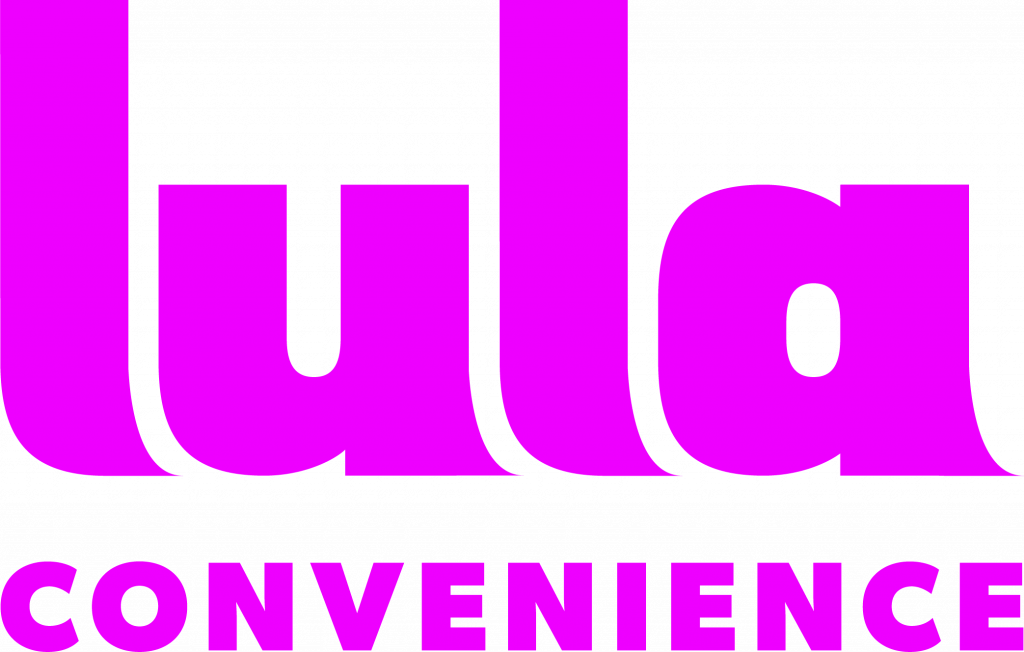
🎯 SaaS-enabled marketplace 📍 Philadelphia, PA
🎙 Adit Gupta, Co-founder & CEO 📧 adit@luladelivery.com
Lula Convenience helps retailers through their digital transformation journey. Whether that’s getting a store or chain of stores onto all online delivery, pickup, catering, or helping them launch their own website, Lula is the one-stop shop vertical saas solution trusted by several thousand retail locations across the United States.
Best Outlander VC value-add: Access to an incredible network & candid feedback available 24/7.
Best advice from Team Outlander: It’s vital to keep burn low, and while most founders decide to increase burn, they often forget to cut unhealthy fat – something you need to think about every single day (not once a year).
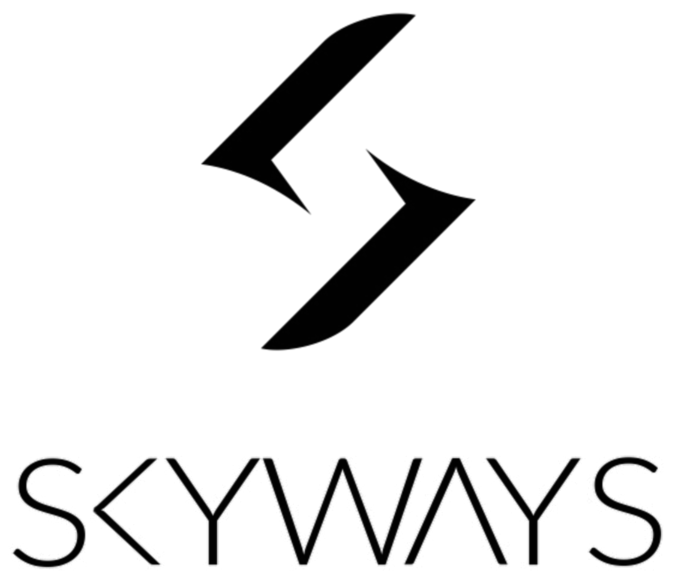
Skyways is creating a new form of transportation to advance our civilization. Starting with fully autonomous cargo drones sold to DoD and B2B commercial markets, Skyways drones allow transportation of parts to complex or dangerous places. Once we operate for our customers with thousands of aircraft at scale, we will then build a larger aircraft to transport people and address traffic congestion issues. Ultimately, we want to become the world’s largest airline and completely rethink how we move cargo and go places.
Best Outlander VC value-add: Proactive and moves fast when needed.
Best advice from Team Outlander: When in doubt, there’s no doubt — fire people immediately.
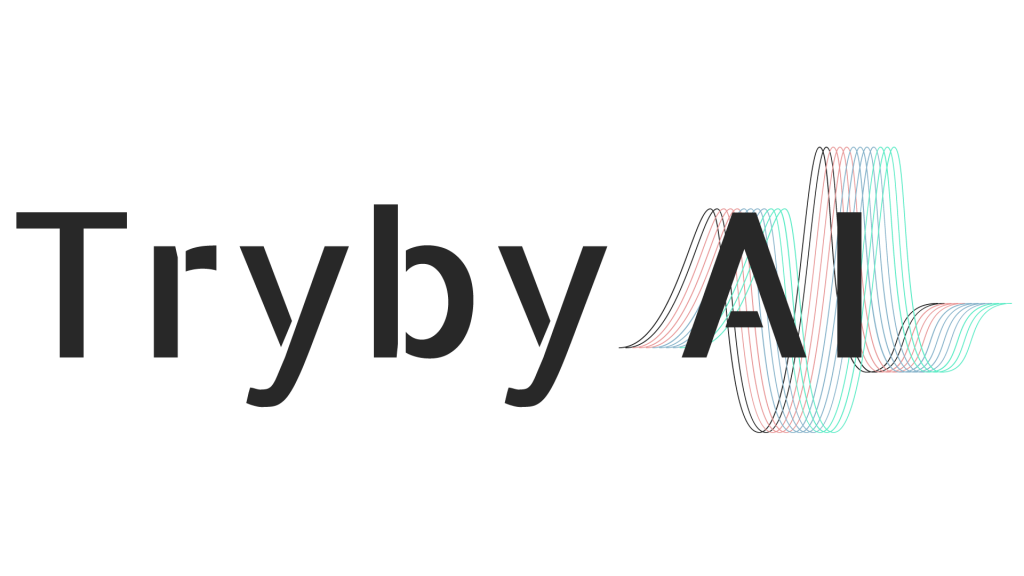
Tryby AI is building hyper-realistic, advanced conversational AI for businesses that answer and execute on 100% of calls, 24/7. Today, businesses struggle to maximize revenue from leads and spend hours each week on repetitive responses & actions. We help our customers provide exceptional service to their customers with AI, growing their revenue while saving their teams hours on daily tasks with our conversational AI and AI agents.
Best Outlander VC value-add: Exceptional partners who care for you. Foster growth through the extensive Outlander network and provide insightful feedback throughout the startup journey at any point and time.
Best advice from Team Outlander: Move fast, keep an open mind, and pivot fast if needed. I appreciate not only the advice but also the confidence and support Outlander provides to founders to execute on ambitious, ambiguous, but promising problems and tech.
Building a successful startup requires a founder with exceptional vision, intelligence, character, and execution to navigate the inevitable ups and downs. In the Outlander Unicorn Rodeo Series, we sat down with founders Blake Hall of ID.me, Fritz Lanman of Mindbody & ClassPass, Jonathan Neman of sweetgreen, Josh Reeves of Gusto, Matt Pohlson of Omaze, and Waleed Nasr of Medely to dig into the early strategies of these now-unicorns.
Here’s their advice for founders beginning their startup journey:
1. Conviction is the foundation of startup success: First and foremost, only start a company if you can’t imagine not doing it. Startups require immense resilience and sacrifice that can only be justified by a founder with a greater level of conviction. The most successful founders truly understand and deeply resonate with the problem space they’re trying to solve. Compelled by how their vision will change the future for the better, impact-driven founders are more likely to persevere when things inevitably get tough.
“Don’t do it unless you have to do it—unless you’re just so compelled that it’s not a decision.” — Fritz Lanman of Mindbody & ClassPass
“Companies don’t exist for the sake of it. We exist to fix stuff. It all starts with the problem space. It all starts with something being broken and painful, and you’re so compelled to try to fix that thing that you almost have to start a company to fix it because it’s not getting fixed otherwise.” — Josh Reeves of Gusto
2. Build a complementary, mission-driven team: Identify your strengths and weaknesses as a founder, then seek mentors and team members who augment your capabilities. Beyond complementary skills, your core team must share your conviction and be bought into the vision. Invest in a strong relationship foundation with your team, especially co-founders. Company culture can make or break your long-term success, and hiring a people/HR leader early can enable founders to remain focused on product and sales without sacrificing the top-tier talent needed as the company scales.
“The single most important thing for a first-time founder is to get mentors that help you with your blind spots. Be really cognizant of the archetype that you fit into, and build a founding team that complements but doesn’t duplicate your skill set.” — Blake Hall of ID.me
“Hiring as a search for alignment. You don’t convince someone to join, and they don’t convince you to hire them—it’s both parties figuring out, ‘Can we do something great together and having an intentional approach to that?’, whether it’s the values, motivation, skill, alignment approach, or whatever you create.” — Josh Reeves of Gusto
3. Storytelling is an early-stage founder’s most valuable tool: Your ability to sell your vision is crucial for not only fundraising but also hiring, sales, product development, and beyond. Investors invest in the story, not just the numbers—especially in the early days when experienced VCs know not to expect flashy metrics yet. Likewise, storytelling is critical in mobilizing a team around a shared vision. In the early days, there’ll be less capital to offer potential hires, so founders must sell the vision to attract top talent. The best way to craft a compelling pitch is by going out and pitching over and over, A/B testing your way through it. Similarly, get your hands dirty and personally tackle customer support and product testing challenges. This hands-on approach gives you greater insight into your company, helping you lead and fundraise more effectively.
“The most underrated skill set for an entrepreneur—the one that I would argue might be the most valuable, but people invest the least in—is storytelling. Investors use numbers to fortify the story, but they’re investing in the story.” — Matt Pohlson of Omaze
“If you can’t convince a great engineer to come and work for you and build this thing, you’re going to have a really hard time building a successful company.” — Fritz Lanman of Mindbody & ClassPass
“But for growth-stage investors, when you’re coming up to pre-IPO type level, the story matters 25%. Your numbers matter more than anything. Being to being able to tell the story about your numbers became more important than just the story.” — Waleed Nasr of Medely
4. Prioritize everything against your North Star Metric: Have a deep understanding of your metrics from the early days. Prioritize initiatives that scale your core business and contribute to your North Star Metric (NSM). Start small and remain capital-efficient in the early days by focusing on what advances your value proposition. By staying lean and agile, you can prove your business proposition without over-raising capital and, in turn, raising the bar for your next round or exit.
“Think about what that core business is and make sure you’re investing in what your real value proposition is, not some of the other stuff on the periphery.” — Jonathan Neman of sweetgreen
“The military teaches that you always need to lead two levels down. For me, I’m responsible for the profits and losses (P&L). That’s ultimately what I’m accountable for to my investors and the board. So, in order for me to have confidence that my reports are bringing clarity and focus on what matters, they have to show me that they understand how the different things they do tie back to our P&L and then say, based on this, here are the KPIs that are always true.” — Blake Hall of ID.me
Throughout the Outlander Unicorn Rodeo Series, every founder emphasized the importance of vision, resilience, effective team-building, and alignment with the company’s mission as the cornerstones of successful early-stage startups. Without this foundation, it’s easy for founders to lose the forest for the trees. Unsurprisingly, each founder emphasized the need for a North Star Metric to serve as a compass for all aspects of company building.
However, as Fritz Lanman advised, there’s no substitute for a founder getting their hands dirty, which is why hearing fellow founders’ experiences is often more enlightening than generalized advice. So, we invite you to watch the full firesides with Blake Hall of ID.me, Fritz Lanman of Mindbody and ClassPass, Jonathan Neman of sweetgreen, Josh Reeves of Gusto, Matt Pohlson of Omaze, and Waleed Nasr of Medely to soak up all of their expertise, and save your spot for our upcoming events, too!
Welcome to Venture Visionaries, a brand-new series brought to you by Outlander VC. Hosted by Paige Craig, Managing Partner at Outlander VC, this series explores what sets these investors apart and provides unique insights into their perspectives on the startup world. Join us as we sit down with some of the most influential investors in the industry, uncovering the secrets behind their success and learning how they navigate the ever-changing landscape of investing.
From their investment strategies to their predictions for the future, we’ll bring you inspiring conversations that’ll resonate with aspiring entrepreneurs and anyone curious about the world of venture capital. So, grab your headphones and get ready to be inspired by the visionaries shaping the future of innovation!
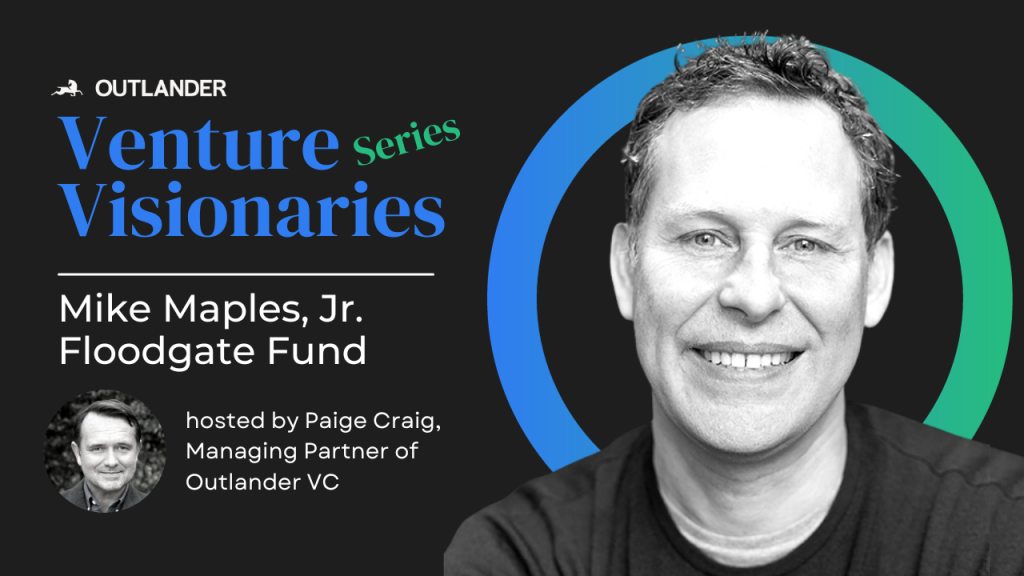
First up, we have Mike Maples, Jr. from Floodgate! Mike is a renowned venture capitalist known for his keen eye for breakthrough startups and his ability to identify successful founders. We’ll dive deep into the key characteristics that make founders successful and the traits that set breakthrough startups apart from the rest. Mike will also share his insights on the role of an investor as a co-conspirator, working closely with founders to drive their success. In our conversation, we cover:
If you’re ready to dive in, listen to our full conversation now to hear Mike’s thoughts on successful founders, breakthrough startups, and the future of venture capital. Alternatively, keep scrolling to discover our three biggest takeaways from the episode, key quotes from Mike, and more exciting content below. 👇
In our conversation, Mike Maples, Jr. emphasized his investment philosophy of backing pattern breakers—individuals who propose a new way of doing things which challenges the status quo. He believes that a great startup forces a choice, not a comparison, and is essentially a challenge to the established norms.
“My job is to invest in pattern breakers,” Maples stated. “A lot of people say that venture capital is about pattern matching, and I actually somewhat reject that. My job is to find the people who propose a new way and say, hey, the way that you’re used to doing things isn’t the best way. There’s this radically different way.”
He further explained, “The pattern breaker engages in pattern breaking thinking, the pattern breaking actions.” Maples believes the pattern breakers are distinguished by their thoughts and actions, often acting in ways that make others uncomfortable, but leading to innovation and change.
According to Mike, inflections play a critical role in a startup’s success. He believes that a powerful inflection point is a precondition for success in a startup, as it provides them with the ability to wage asymmetric warfare on the present.
“I look for, on the ideas front, are they harnessing inflections?” Maples said. “An inflection is kind of like a surfer has to have skill, but they have to pick the right wave. And a good wave is a precondition for success at surfing. And I believe that a powerful inflection is a precondition of success in a startup,” he explained.
He also emphasized that timing is a significant risk factor, and thus, understanding inflections can help in evaluating whether an idea is well-timed or not.
Maples shared his fascination with the rapid advancements in generative AI and its potential implications on various industries. He also discussed the concept of “digital twinning,” where a product’s usage and potential issues are simulated and tested in the digital domain before being built in the physical world.
“The thing I find interesting about AI is there’s so many inflections and they’re happening so quickly and they’re so unpredictable that one thing displaces the next thing from one week to the next,” Maples said.
“It’s not how I would have normally thought about things in the past,” he said, discussing digital twinning. He added, “You start to wonder if more and more products will have a digital twin that is specified, and then that digital twin will simulate lots of different corner cases.”
Mike Maples, Jr. is a co-founding Partner at Floodgate. He has been on the Forbes Midas List eight times in the last decade and was also named a “Rising Star” by FORTUNE and profiled by Harvard Business School for his lifetime contributions to entrepreneurship.
Before becoming a full-time investor, Mike was involved as a founder and operating executive at back-to-back startup IPOs, including Tivoli Systems (IPO TIVS, acquired by IBM) and Motive (IPO MOTV, acquired by Alcatel-Lucent.) Some of Mike’s investments include Twitter, Twitch.tv, Clover Health, Okta, Outreach, ngmoco, Chegg, Bazaarvoice, and Demandforce.
Mike is known for coining the term “Thunder Lizards,” which is a metaphor derived from Godzilla that describes the tiny number of truly exceptional companies that are wildly disruptive capitalist mutations. Mike likes to think of himself as a hunter of the “atomic eggs” that beget these companies.
Mike is the host of the Starting Greatness podcast, which shares startup lessons from the super performers.
I have been investing in AI startups for most of the last decade. AI startups have been hot recently, with a reported $75 billion invested in the space in 2020 alone. In 2016, however, getting investors to take AI seriously was no small feat. Then, AI felt like something from Star Trek, and while the ideas were fascinating, many investors wondered, “How will you make money?” Admittedly, it is hard to predict how foundational technologies will create value but I’ve always hedged my bets on exceptional founders first and foremost, which is what led me to write first checks into two AI unicorns back in 2016.
When I was introduced to the Scale AI and Imbue founders, they were purely in the idea stage: pre-product and pre-business model. That year alone, I’d received hundreds of AI startup decks, investing in only five or so. Of those handful of AI bets, only these two grew to multi-billion dollar companies. In both instances, it was all about investing in the right founders, then helping them find the right vertical.

From recruitment tech to Imbue:
In January 2016, I was introduced to the founders of Imbue. Formerly known as Sourceress, they were building an AI tool to source candidates for recruitment efforts, match those candidates with open roles, and send personalized outreach to schedule initial interviews. From our first call, the founders were exceptionally smart, curious, and customer-driven, jotting down notes from our discussion on how to build a successful brand. There was no fundraising deck, but only three months into building the business, they’d already acquired customers, proven initial interest, and were poised to solve a massive problem using AI.
By February 2016, we became their first investors, investing $500k at $4.8M Cap. Over the next five years, I introduced the founders to potential customers and met with them for monthly brainstorms, especially as they worked through their pivot in 2019. While the initial focus on recruitment had already evolved into sales, their pivot to an AI with more generalized intelligence was the key to their success. With this broader scope, Imbue has created a fundamental technology that will change the world. With its latest $200M in Series B funding and $1.5B valuation, Imbue’s primary mission is to drive the development of AI systems capable of advanced reasoning and coding. The company is poised to create practical AI agents capable of accomplishing substantial tasks while maintaining safety in real-world applications.
One of the few women-led AI unicorns, Imbue co-founder Kanjun Qiu is really excited about “how can we make that accessible to everyone so that everyone can imbue intelligence and be able to use that intelligence.”

From medical matchmaking tech to Scale AI:
Back in April 2016, Scale AI co-founder Lucy Guo reached out to me on Twitter, pitching the first iteration of Scale AI. Initially, they were building a tool to help millennials find medical professionals with the unique idea of rating specialists by specific tasks/procedures versus a generic rating. While I wasn’t 100% sold on the product/market, I was beyond impressed with the founders. Both Lucy Guo and Alexandr Wang are hands-on, driven, brilliant, and possess the kind of locus of control and communication skills that inspire others to join their teams, help them succeed, and invest in their vision. In every conversation with Lucy, she is unfaltering in her creative problem-solving and unafraid to experiment and adjust until something finally works. These things were true in 2016 and remain true today, which is why our #1 investment criterion is always the founding team.
Two months later, Lucy reached out with their latest pivot, the Scale API: “With just one line of code, you can deploy a human on-demand to do tasks such as content moderation, data extraction, appointment scheduling, and more!” I immediately wrote back to tell her this pivot was critical and that they should drop everything else and run with it. With their exceptional Founder Framework scores, I knew they could build something big and had the grit to pivot as needed. So, in August of 2016, I invested $150k SAFE on a $3M cap in what is now Scale AI, the $7.3B AI unicorn; and then reinvested months later when they raised a much larger seed round.
Most recently, co-founder Alexandr Wang was recently named one of the top 100 Most Influential People in AI and spoke at the White House on the risks of AI, while Lucy Guo has joined our portfolio a second time with her latest venture: Passes.
–
Now that AI has become crowded with everyone on the hunt for their AI unicorn, I take a slightly different investment approach. I still look for the right founders and the right vertical, but I take a more nuanced approach looking for niche, verticalized applications of AI largely within SMB, enterprise, industrial and government applications.
A few examples below:

Coco Delivery – AI for Enterprise Logistics
Coco Delivery has married robotics with AI to augment its human workforce. Coco’s robot delivery fleet is driven remotely by humans plus an AI co-pilot. Learning from the human drivers, the AI co-pilot is initially used to augment the human driver, quickly reacting to obstacles, monitoring speed, etc. Eventually, the AI co-pilot will replace the need for a human driver piloting every delivery, elevating the human workers to oversee fleets of robots.

Fabi – AI for Data Science
Fabi is leveraging AI and natural language processing (NLP) to democratize data insights. Fabi’s AI enables seamless communication with datasets for non-technical teams, empowering them to extract meaningful insights independently. Likewise, leveraging Fabi’s AI enhances the efficiency of data science teams by transforming the way they analyze data and providing advanced tools for analysis. Fabi’s application of AI ultimately fosters a more collaborative and productive data-driven decision-making process across many industries.

Skyways – AI for Drone Navigation
Skyways is a company at the forefront of advancing drone technology. In addition to their innovations in aviation, Skyways is leveraging AI to overcome traditional limitations and enhance the autonomy of drones. Skyways’ cutting-edge AI technology allows drones to navigate and operate seamlessly even in areas where GPS signals are unreliable or unavailable. This technology has significant implications for various industries, opening up new possibilities for autonomous drone applications in challenging and complex environments.

Barometer – AI for Brand Safety
Barometer leverages advanced artificial intelligence to enhance brand safety and contextual targeting in the realm of podcasts. Their innovative approach involves machine learning algorithms to analyze and understand podcast content, ensuring that advertisers can maintain a safe and contextually relevant environment for their brands. This innovative approach allows major brands to ensure their advertising is aligned with values in a rapidly growing podcast space.
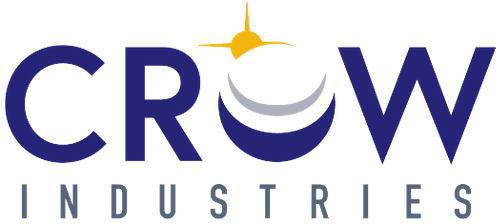
Crow Industries – AI for Mining Operations
Crow Industries (CI) is building the Robotic Labor Force of the mining industry, creating autonomy for heavy equipment and underground operations. CI’s initial product enables the mapping of mines 10X faster than traditional methods, while simultaneously collecting real-world training data for the autonomous models. CI’s robotic solutions are addressing the ever-growing need for safe and reliable labor as the mining industry rapidly continues to grow.

Vidrovr – AI for Video Analytics
Vidrovr uses patented AI and multimodal machine learning algorithms to understand video like a human would, and then helps businesses make smart, efficient, and profitable decisions based on the information in video. Vidrovr is revolutionizing an outdated and arduous process of data collection, analysis, and instrumentation by bringing the task to the physical world through video analysis. Today their system is driving efficiency for leading federal and private sector companies.
Within AI, we are particularly focused on startups using this formula: 1) a gritty, complicated, or mundane job that usually requires a human worker to be on-site somewhere to do the job, plus 2) AI that learns from that human worker until it can do the labor intensive/repetitive or complicated tasks at a faster, more efficient rate. AI’s ability to extend a person’s capabilities will revolutionize how we work and live, and that’s where I’ve always loved to invest.
For 14+ years, we’ve been investing in unicorns like Lyft, Wish, Gusto, and Scale at the earliest stages. Now, meet 5 of our current early-stage portfolio companies that presented at our 2023 Outlander Fall Showcase!
From innovations in AI/ML in computer vision, Mar/AdTech in consumer product sampling, future of work via flexible talent marketplaces, paid membership and SMB community building, and e-commerce and API for B2B equipment rentals, these companies are building the future of everything:

🎯 SaaS, B2B, rental, e-commerce 📍 Atlanta, GA
🎙 Donald Boone, Co-founder & CEO 📧 hello@tryboxedup.com
BoxedUp is a subscription-based software that allows equipment rental companies to set up online stores quickly. Founded by three Amazon alum, the company uses APIs and a set of rental-specific features to streamline equipment quoting, logistics, and inventory management so that B2B suppliers can grow their operations. In just 3-months, the company has amassed more than $20M of contracts with suppliers in industrial equipment and motion-picture categories.
Best Outlander VC value-add: Experienced team, access to successful founders and investors, and a robust network.
Best advice from Team Outlander: Find a problem in an underserved market that you’re uniquely qualified to solve, build a solution for an underserved customer group, and grow it from there.

🎯 SaaS, paid membership, virtual community 📍 Atlanta, GA
🎙 Murtaza Mambot, Co-founder & CEO 📧 founders@heartbeat.chat
Heartbeat is an all-in-one SAAS platform for managing large communities for SMBS digitally. People are tired of duct-taping Slack + Notion + PayPal together, and we do it all in one platform & give them the tools to scale engagement and revenue fast (i.e. subscription management, upsells, affiliate tracking & payouts). They often make 3x revenue in 6 months.
Best Outlander VC value-add: he fundraising assistance is huge — They secured 70 meetings in 2 weeks to close out follow-on capital for our pre-seed round. All incredible investors & many of them we never dreamed of ever getting meetings with.
Honestly, the thing I’m most grateful for, though, is the day-to-day operating advice. Leura has helped a TON with key strategic decisions — and doing that together for months & months has massively helped us fine-tune our own product sense & build something really meaningful. She constantly pushes us to challenge our assumptions & think more strategically, given the limited resources we have as a startup, and we are so, SO much better for it.
Best advice from Team Outlander: What to prioritize while building a product. We get hundreds of feature requests from our customers, but our focus is always on prioritizing features that over 50% of users will immediately use and either grow revenue or improve stickiness. Everything else is secondary.
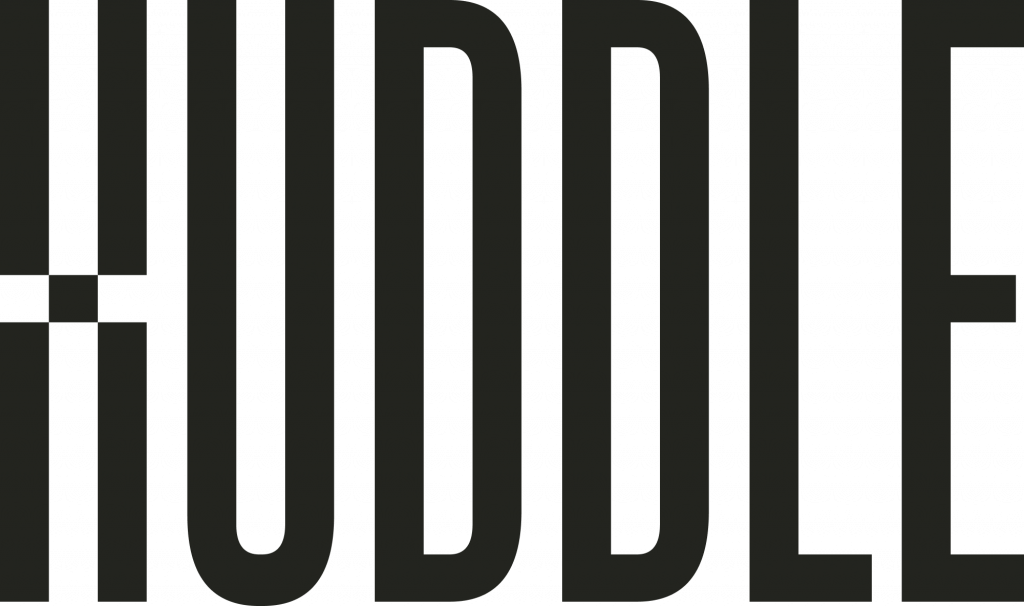
🎯 future of work, marketplace 📍 Miami, FL
🎙 Michael Saloio, Co-founder & CEO 📧 mike@huddle.works
Huddle is a market network where founders can reserve time with flexible teams of expert designers and builders. Today, we’re an elastic workforce that makes it easy for startups to hire fast and flexibly, where you can post a project and start with your team in under a week. Our network is a highly vetted community of ~1k builders from companies like Square, Spotify, Amazon, and more. In the future, we will be the online HQ for the most in-demand workers in the world.
Best Outlander VC value-add: Fundraising and talent support (in areas beyond technical talent) and advice from seasoned founders and investors.
Best advice from Team Outlander: Paige and Leura’s advice all seems aligned with one key theme. In my own words, I’d summarize it as: “Swing BIG, stay scrappy.”
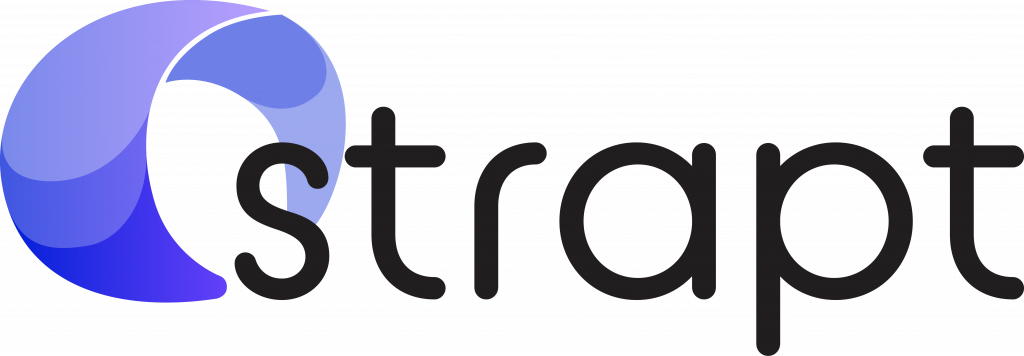
Strapt is reimagining CPG marketing through experiential, automated, and data-driven product sampling. Through their innovative service model, Strapt has identified a uniquely scalable approach to vending that offers CPGs their first opportunity to get products into consumers’ hands at the exact point of need, all while driving measurable traffic, conversions, and upsell opportunities for their partners.
Best Outlander VC value-add: Outlander’s network seems endless. Whether investors, customers, mentors, or otherwise, Outlander always seems able to connect me to the right person at the right time.
Best advice from Team Outlander: Stay focused on the vision. As an early-stage company, there are endless ways to grow and scale. Team Outlander has helped me identify and adopt (or disregard) strategies and opportunities that keep me laser-focused on realizing our vision.

Vidrovr transforms video data into knowledge for enterprise and federal leaders. Our patented and proprietary machine learning technology unearths the mission-critical insights hidden in messy, unstructured video data sources like social media, terrestrial cameras, live television, aerial footage, and beyond. Our platform will help you transform video data into knowledge whether you’re a major broadcaster analyzing how guest appearances impact TV ratings, an airfield evaluating the safety of a plane live plane landing, or a DoD analyst reviewing thousands of hours of video to determine movement patterns. Vidrovr is the key to unlocking the information decision-makers need to drive revenue, lead strategically, and automate monotonous processes. To date, Vidrovr has analyzed over 25 billion frames and monitored over 2700 unique data feeds for organizations such as the US Air Force, State Department, DARPA, Associated Press, and many other enterprises.
Best Outlander VC value-add: Too many to name! We’ve hired folks directly from Outlander referrals, which has been a major value-add. The team is never afraid to dive deep with you and get into the nitty gritty details of solving a problem. Finally, they’ll always give you their honest assessment of where you’re succeeding and where you need to improve.
Best advice from Team Outlander: We lost a candidate due to our offer process and some inefficiencies that we had. The team helped us revamp how we communicate offers. We haven’t lost a candidate we’ve given an offer to since that advice.
While a great deck and pitch are imperative, they’re just the tip of the fundraising iceberg—especially in today’s market, where investors do more diligence before writing a check. Since securing a “yes” from investors from an excellent first pitch is unlikely, founders need a 360° fundraising strategy to convert pitches into capital. So, after securing a first meeting and nailing your pitch, here’s how we coach our portfolio founders through the two critical “closers” of a successful fundraising strategy: consistent follow-ups and a robust data room at the ready.
Fundraising is a time-consuming necessity for founders, so being prepped and ready is paramount. Immediately after a pitch, have your first follow-up email queued to send, thanking them for their time and providing access to your data room. Quick responses throughout the fundraising process signal that you are serious about your raise, proactive about potential concerns, and respectful of their time.
At every stage of the raise, your follow-ups should be consistent and professional, acting as an extension of your pitch. Here’s how to wield follow-ups to maximize fundraising efforts:
Every investor operates from a unique investment thesis, which prioritizes different elements of your business accordingly. A robust data room is the most efficient way to quell as many investor concerns as quickly as possible, freeing you up to make more intros, book more meetings, and nail more pitches. Failing to prepare these materials in advance will delay your response to investor concerns, potentially jeopardizing funding.
Your data room has to be secure and accessible by only designated people, such as your potential investors. An impressive data room will show investors that you’ve put time, energy, and thought into how you’re running your business today and how you plan to run your business in the future, including but not limited to:
An initial pitch can only cover so much and dive so deep, so providing supplemental materials shows you’re a prepared, strong operator who has done their homework on the business you’re trying to build. Think of your data room as not only a repository of your financial and operational documents but as a place to illustrate the full breadth of your vision. Include supporting documents that speak to your future vision for the business, such as future product development, future sales or marketing initiatives, and other strategies that you couldn’t cover in your initial pitch deck.
Early-stage investments are a bet on the founding team’s long game. As you court potential investors, part of your job is to build their trust and conviction that you understand the problem you’ve set out to solve and are the right person to build its solution. So, as you implement these follow-up strategies and build your robust data room, treat each piece of outreach or supplemental materials as an extension of your pitch: professional, optimistic, and well-crafted.
And if you’re an exceptional early-stage tech founder building something big, we want to hear. from you! Learn more about Outlander VC’s investment strategy and connect with our investors now.
The journey of startup fundraising is a process of risk removal. At each Series, certain risks are expected by investors, certain risks diminish, and the company gets more valuable as they do. With enough foresight, founders can leverage the timing of their raises and control the answer to the age-old startup question, “What are we worth?”
For our first Outlandish Speaker Series, we hosted serial founder and venture capitalist Eric Feng to tackle the importance of timing in fundraising. With a background in computer science, Eric has successfully built and sold three companies and loves investing in the consumer, media, and commerce sectors. He previously led e-commerce at Facebook, led early-stage consumer Internet investments at Kleiner Perkins, and was the founding CTO and Head of Product at Hulu. As of this Field Guide, he is the co-founder and CEO of Cymbal and a General Partner at Gold House.
Here’s how Eric Feng advised founders to think about and time their next round of funding. 👇
–
Marc Andreessen says, “Running a startup is also how I think about raising money — it’s a process of peeling away layers of risk as you go.” And as you peel, always keep your next raise and its potential investors front and center. Investing your energy and runway into minimizing stage-appropriate risks allows you to control the timing and context of your startup’s price.
For 14+ years, we’ve perfected investing in unicorns like Lyft, Wish, Gusto, and Scale at the earliest stages. Now, meet 5 of our current early-stage portfolio companies who pitched at the Outlander Spring Showcase!
From innovations in robotic automations in hospitality, fintech marketplaces for investing in VC funds, no-code productivity and compliance platform for field data, B2B manufacturing marketplaces, consumer health tech for care data tracking, these companies are building the future of everything:
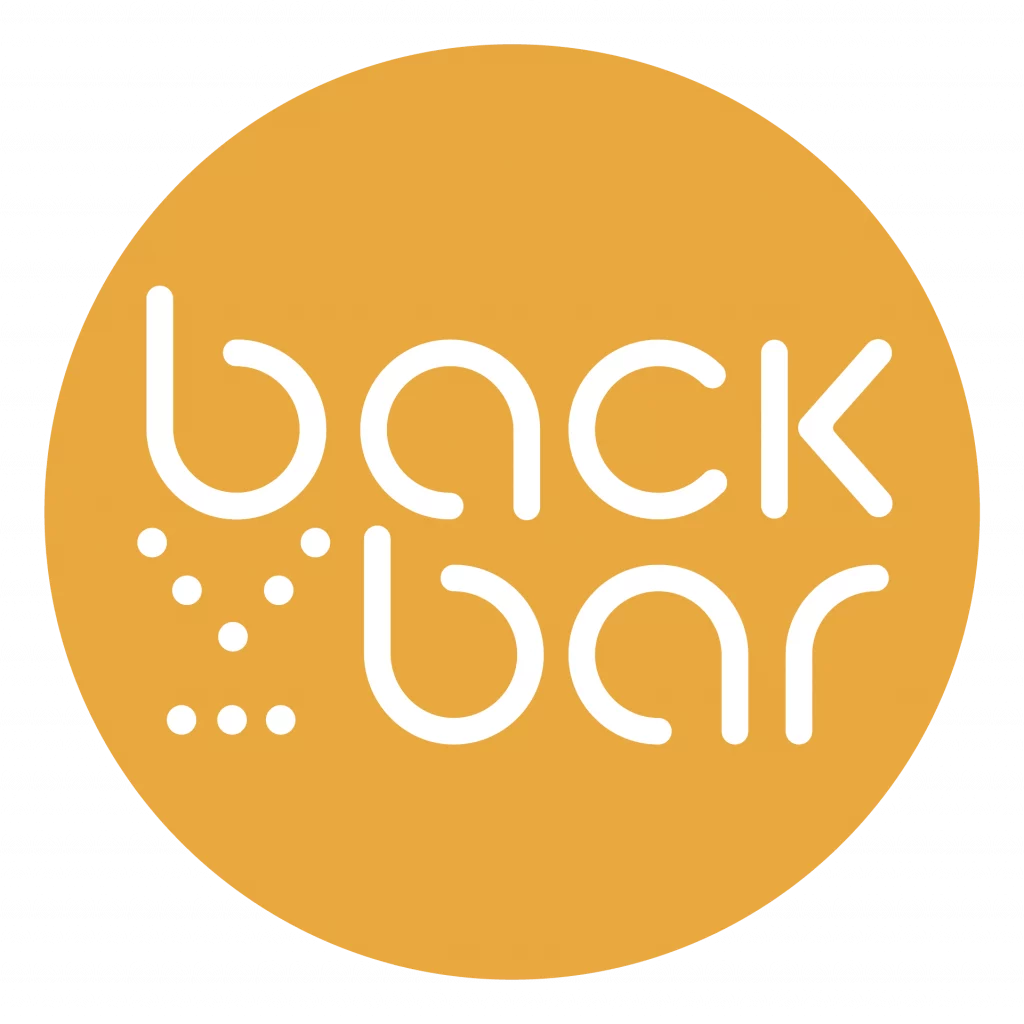
SaaS, automation, ecosystem
Backbar is automating the creation of complex beverages like cocktails, mocktails, coffees, superfood juices, and more. We’re solving for increasing cost pressures, labor shortages/turnover, and lacking guest experience by creating an end-to-end beverage platform. We’re going to make a 3-5% margin improvement in an industry where $70 billion is spent every month.
Based in San Diego, CA, co-founder and CEO Rishabh Kewalramani is laser-focused on optimizing hospitality’s highest-margin product, beverages, with the largest innovation in decades through BackBar.
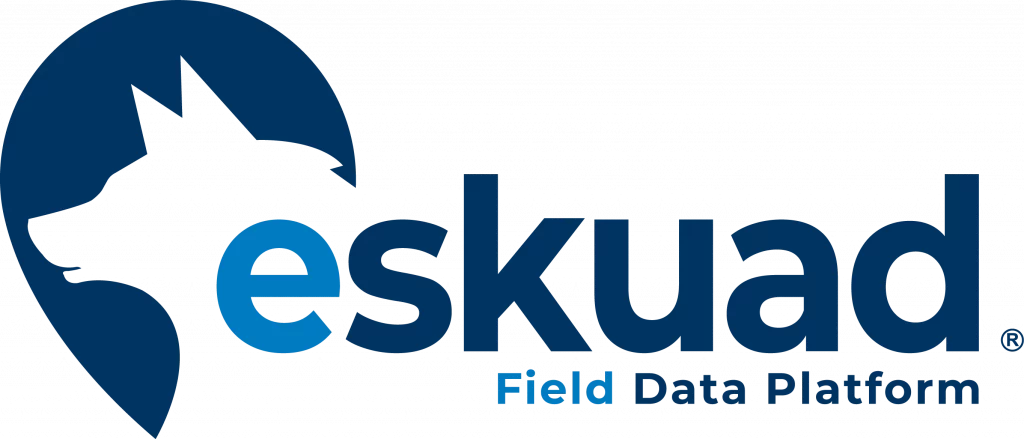
SaaS, mobile-first, future of work
At Eskuad, it’s our mission to help natural resource squads save time and resources by providing access to our platform anywhere and anytime, regardless of internet connectivity. Eskuad’s platform makes it easy to digitize old-school paper forms as well as automate data collection like GPS information, direct upload photos, and automated reporting. Designed for field operators that operate in Natural Resources and Environmental related companies, Eskuad is connecting the disconnected and building the future of field work.
Based in Atlanta, GA, founder and CEO Max Echeverria is committed with simplifying and streamlining field work with no-code productivity and compliance technology through Eskuad.

SaaS, enterprise, manufacturing, marketplace
Made is a B2B marketplace platform that solves points of friction between aerospace and defense manufacturers and US-based suppliers. We focus on cutting down lead times with fast quoting, superior ERP tooling, and a robust marketplace of suppliers building the highest quality goods for the toughest environments.
Based in Boulder, CO, founder and CEO William Allen is obsessed with building a B2B marketplace platform for manufacturers to meet and work with suppliers through Made.
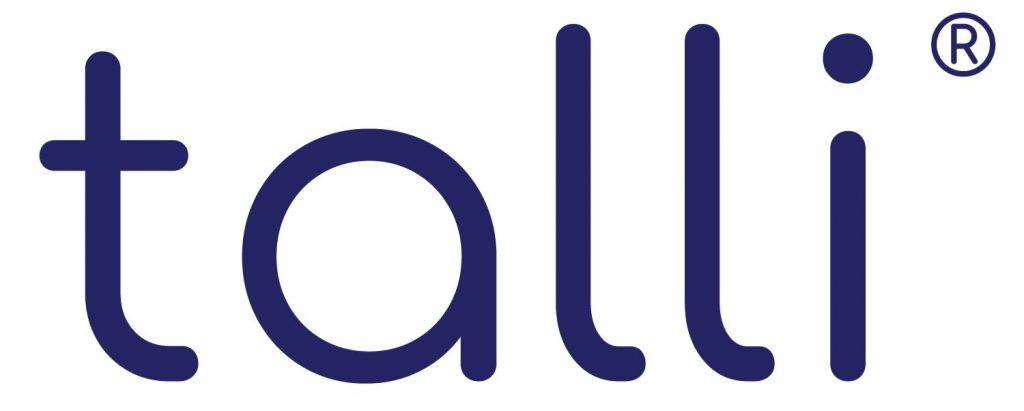
health tech, care economy, IoT, SaaS
Talli is a modular, configurable platform of software and hardware options designed to take the work out of capturing daily care and health information across the $648B care economy. We started with babies because that’s where the Talli story began. We’ve done $1.1M in revenue in the baby market with 16k MAU and 30M events logged. We grew our revenues by almost 400% from 2021 to 2022 and our SaaS revenue is growing an average of 36% per month since launch. Now, we’re expanding into senior care as well. After making our platform fully configurable in the summer of 2022, we started seeing customers buying our baby product and adapting it for care of their aging parents. Even before releasing a configuration marketed for elder care, we had more than 500 users in our database logging for someone over the age of 60. We’re releasing our Talli Care configuration for senior care and chronic conditions on March 22nd.
Based in Atlanta, GA, founder and CEO Lauren Longo is disrupting consumer health tech with a flexible, a la carte platform of software and hardware options for simple tracking of daily care and health information through Talli.

fintech, wealth management, marketplace, AI
Velvet makes it easy for institutional investors to discover, evaluate, and invest in private funds. The traditional process is tedious, difficult, and expensive. We’re here to make private funds simple and transparent. We save investors time by listing funds at scale, automating diligence, and simplifying the investment process. Velvet helps you easily discover funds, connect with managers, evaluate track records, and make investments on behalf of clients or yourself. Velvet curates hedge funds, venture capital, private credit, and private equity at scale. Our listing platform makes it easy to find pre-vetted funds based on mandates, categories, fund types, asset exposure, size, returns, and more.
Based in Salt Lake City, UT, co-founder and CEO Andrew Pignanelli is obsessed with building the future of private finance through Velvet.